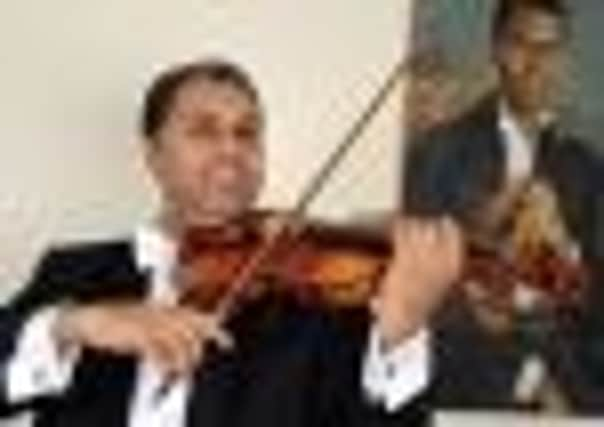Musician finds new variation on a theme


At just four years old, Michael Kellet was labeled a child prodigy when he began his musical journey which would see him perform with some of the world’s top musicians.
But in 2003 the violinist thought his career was over when an orthopedist told him to stop playing or he could lose the use of his right arm.
Advertisement
Hide AdAdvertisement
Hide Ad“My world came to an end,” said Michael, from Morley. “I had been in denial but I could no longer avoid the fact that I may never be able to play again. I felt suicidal. Playing was my life.”
It was the years of constant bowing and an old gymnastic injury from when he was a child which caused Michael’s problem.
He was suffering from something called rotator cuff impingement syndrome, a painful condition affecting the tendons in his right shoulder.
As a child he could turn his hand to virtually any instrument, but it was the violin which stole his heart and, after studying with some world renowned teachers, at the tender age of eight he appeared as a soloist and at 10 he won a national talent competition.
Advertisement
Hide AdAdvertisement
Hide AdHe studied at the Royal Scottish Academy of Music & Drama and shortly after he was offered the position of associate leader with the Scottish Opera – at only 21.
A glittering career followed, including a world tour; in 1995 he toured the world with Lord Yehudi Menuhin and the Royal Philharmonic Orchestra for the United Nations.
The following year, he took a job with the London Philharmonic Orchestra which fulfilled his every desire in the music world: sharing the international concert stage with the top conductors and soloists, touring the world, recording film soundtracks (including Philadelphia, East is East and the Lord of the Rings Trilogy).
“I was playing constantly,” recalls Michael. “I had been in pain for some time and it has started to affect my playing, but I convinced myself that it was mental rather than physical and I was worried about my technique.”
Advertisement
Hide AdAdvertisement
Hide AdBut a visit to an orthopaedist revealed that Michael did in fact have rotator cuff impingement syndrome – an excruciatingly painful condition, which prevented any movement of his bowing hand. Many violinists suffer injuries to their tendons and in Michael’s case it had become serious because he had ignored warning signs.
“He said ‘Michael, you must stop playing immediately or you may lose the use of your right arm.’ My world came crashing down.” He was also told that he would need an operation to relieve the pressure on his damaged tendon.
Although he was against the idea of an operation, Michael knew if he ever wanted to play again he would have to go through it, but he admits that he did not register that there may be side-effects from the treatment.
“I was left with a frozen shoulder and in agony. For three months I couldn’t move my arm at all and it was just strapped to me, useless. I was on such strong painkillers I couldn’t think straight.”
Advertisement
Hide AdAdvertisement
Hide AdMichael says both the physical and emotional pain was hard to bear.
“I couldn’t even listen to a violin being played, I just couldn’t bear it. I feared that I may never be able to play again.”
A second operation did give him some use back in his arm for a short period, but doctors told him there was nothing more they could do. “I just had to get away,” he says. “I went to India, it was my way of coming to terms with the end of my career. I had to take time to heal emotionally and physically.”
Although Michael was unable to play for long periods of time he started to teach and hold masterclasses, and he set up a company in Goa helping underprivileged children, working with Bollywood celebrities.
Advertisement
Hide AdAdvertisement
Hide Ad“I felt I needed to give something back. I had been given this talent and even if I couldn’t play any more I could give people the chance to experience what I had experienced.”
He also explored some alternative and spiritual healing and says he now has 70 per cent use of his arm back. He has returned to the UK although he still travels to India frequently.
“I am semi-retired and know that I will never be able to play on the orchestra circuit again, but I can deal with that now that I am helping others, and also the fact that when I had to stop I was at the height of my career, I couldn’t really have gone any further, now I am happy passing on what I have learned.”
Michael has a new solo CD Cheek to Cheek out and is working for Sheffield City Council Music Service one day a week as well as at The Yorkshire College of Music and Drama in Leeds.